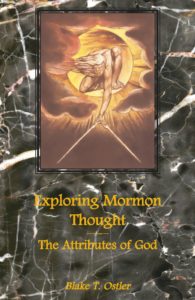 Title: Exploring Mormon Thought: Volume 1, The Attributes of God
Title: Exploring Mormon Thought: Volume 1, The Attributes of God
Author: Blake T. Ostler
Publisher: Greg Kofford Books
Genre: Theology
Year Published: 2001
Number of Pages: 536
Binding: Hardcover
Reviewed by Erik Champenois
I read volume 2 of Exploring Mormon Thought a few years ago, and volume 1 is in my opinion even better. Ostler’s book is very philosophical – to the point that this is not an easy or recommended read for the lay reader. Yet, and occasionally in spite of but mostly because of the sometimes lengthy logical arguments, I thoroughly enjoyed this book and recommend it to anyone who wants to delve more deeply into Mormonism from a deeper philosophical and theological perspective.
This book discusses the attributes of God using the analytic method – dissecting and arguing for the coherence or incoherence of various arguments to eventually arrive at general principles. Front and center are traditional Christian understandings of God versus an understanding of God based on process theology versus an understanding of God based on Mormon scripture. Some of the key questions are whether God is truly omnipotent, omniscient, and omnipresent, immutable, timeless, and whether infallible divine foreknowledge is compatible with free will.
In the process, Ostler argues convincingly (at least to my mind) that the traditional Christian understanding of God as an immutable, timeless, impassible, omniscient, omnipresent, and omnipotent being is contrary to scripture and a corruption of original Judaic-Christian principles through their mixture with Greek philosophy. The Old and New Testaments presents a God who is affected by his interactions with humanity, who changes his mind when people repent, and who is located within this spatiotemporal world. Greek philosophy mixed with Christianity, on the other hand, resulted in a divinity of abstract philosophical perfection removed from this temporal and material world, living in an eternal present, and not influenced by our actions. The amalgamation of Christianity and Greek philosophy correlates neatly with the LDS teaching of the Great Apostasy – with the Restoration scriptures correcting these theological corruptions and pointing us back to the nature of God as found in the original Hebrew scriptures. (Interestingly, Ostler also covers the differences in understanding of the nature of God between various LDS leaders and how prior church leaders predominantly saw God as still progressing in power and knowledge. Whereas Joseph Fielding Smith and Bruce R. McConkie moved towards a more traditionalist understanding of God, in a way paralleling the move from the Hebrew understanding of God to the one informed by Greek philosophy).
Ostler spends a great deal of time arguing that infallible foreknowledge is not compatible with free will. Instead, he argues that God has “maximal” knowledge and knows all that is past and present, but does not know the future infallibly – only the potential futures and their probabilities. I find the argument of this incompatibility convincing, although I see the concept that God has maximal knowledge as a statement of belief that can be argued from the perspective of those church leaders who believed that God still progresses in knowledge. I also think that the arguments serve to show how a traditional understanding of Christianity really doesn’t fit well with the concept of free will, thus making Calvinism the logical culmination of a God who knows the future infallibly.
The book is not a philosophical argument for the existence of God nor does it delve into how God intervenes in our world. Instead, the book takes for granted that there is a God, uses logic to argue for an understanding of what attributes God can or cannot logically have, and then ties these arguments into LDS scripture and the teachings of Joseph Smith. While the book therefore mostly includes extensive propositional logic, it also to some extent assumes or incorporates its arguments within an LDS understanding of divinity as consonant with LDS scripture. Surely Ostler’s “Exploring Mormon Thought” series is not the final word but it is a strong rigorous foundation that engages Mormon theology at a level not often done before.
[Ostler had his fourth book in this series, God’s Plan to Heal Evil, published earlier this year. Greg Kofford Books’ Black Friday sales continue on their website through Monday, November 30. https://gregkofford.com/collections/black-friday-2020]
